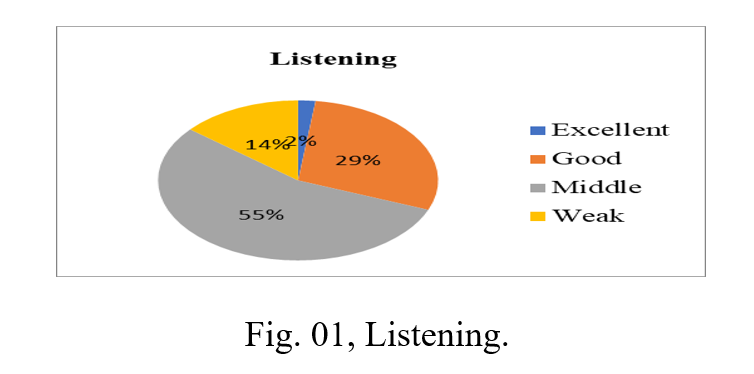
1*A.M. M. Aaqil, 2Muhaz Faizer, 3Rimaza Rizwan Moulana
1*,2 Department of Arabic Language, South Eastern University of Sri Lanka
3Department of English Language Teaching, South Eastern University of Sri Lanka
DOI:10.55559/sjahss.v1i06.33 | Received: 17.02.2022 | Accepted: 27.02.2022 | Published: 03.07.2022
Language is the medium which is used to express the ideas and thoughts of human beings. English is an international language that coordinates with all the sectors in Sri Lanka. Especially in the Educational sector. In the state universities of Sri Lanka, English language courses are being integrated as a common subject in most courses. Hence, the study aimed to identify the challenges faced by undergraduates in enhancing their English language skills. Based on Mixed methods, the primary data was collected through a closed-questionnaire distributed among 100 students out of 350 second-year undergraduates of the Faculty of Islamic Studies and Arabic Language of South Eastern University of Sri Lanka and semi-structured interviews of 30 of them. Secondary data contributed to constructing its theoretical structure. The major findings reveal the emergence of several issues regarding the speaking and listening skills due to the dominance of their mother tongue, Tamil language, other than writing and reading skills because of their involvement in improving such skills through various strategies.
Keywords: Challenges, Skills, English Language, Undergraduates
|
Electronic reference (Cite this article): Aaqil, A. M., Faizer, M., & Moulana, R. R. (2022). CHALLENGES FACED BY THE UNDERGRADUATES IN ENHANCING THEIR ENGLISH LANGUAGE. Sprin Journal of Arts, Humanities and Social Sciences, 1(06), 311–320. https://doi.org/10.55559/sjahss.v1i06.33 Copyright Notice: © 2022 Author(s). This is an Open Access article distributed under the terms of the Creative Commons Attribution 4.0 International License (CC-BY 4.0 : https://creativecommons.org/licenses/by/4.0/), allowing third parties to copy and redistribute the material in any medium or format and to remix, transform, and build upon the material for any purpose, even commercially, provided the original work is properly cited and states its license. |
Language is a kind of medium through which human beings are to express their ideas/thoughts/concepts. Language should not be considered as a tool or instrument only. It is an inseparable part of the natural ability to understand things. "Language is the function and intuition and power of the human mind and the witness of one's mind. That is, language is the total cognition of the human mind". (Rohit, 2012).
Thus, more than 6500 languages are spoken by people in 195 countries worldwide. (Klappenabach, 2021). Although, most of these languages are spoken only within certain countries. Simultaneously, English is one of the most widely spoken languages around the world.
Due to the massive influence of the English Language on education and administrative services, people worldwide are forced to master the English language whether they prefer it or not. On that basis, English is being taught and manipulated in some way in all countries. English is spoken as a mother tongue in some countries and as a Second or target and third language in other countries.
However, according to Sri Lanka, Sinhala, Tamil and English are generally spoken by various people. Here, Sinhala and Tamil are mostly spoken along ethnic lines. At the same time, English is seen as a common language spoken by the majority of the people.
As such, the English language is considered essential in all sectorial and academic activities in Sri Lankan English is taught in Sri Lanka from preschool to university and in the faculties of higher technology. For that, people are trained in the four skills of writing, reading, comprehension/listening and speaking to become proficient in English.
Although, the academic activities and the curriculum in most of the universities in Sri Lanka are taught in English. English is also taught as a general compulsory subject in the most curriculum. Nevertheless, English language proficiency is low among the second-year general students of the Faculty of Islamic Studies and Arabic Language. The study aims to address the challenges students face as they seek to improve their English language skills.
English language and the usage of English language is extremely significant in the University activities in each and every part. Even though, during this period, according to this research and evaluation, the utilization of the English language is very low among the students of the Faculty of Islamic studies and the Arabic language due to various factors. In this circumstance, those identified students are getting not involved to develop their English language and facing plenty of problems in their educational activities due to the lack of knowledge of English language skills. Therefore, this is the major issue identified and the study conducted.
Although researchers on the particular topic have been explored from a variety of perspectives in the past, it has been agreed apparently that there has been no research conducted so far regarding this particular topic and that all topics related to the subject, such as text studies, articles, journals and various documents have been subjected to the literature review.
Reading, Listening, Speaking and Writing are the primary four English language skills. Therefore, the study of these four skills has received the attention of various scholars. It is approached by Aydagan, Halian. (Aydagan, 2014). on the basic, there are four skills belonging to the English language and they are Reading, Listening, Speaking and Writing. It is how the scholar, as mentioned earlier, recognized it.
Similarly, Masdugi. (2016). Say that English skills can be categorized in two significant ways: Receptive and productive skills. He stated that Receptive skills are used to receive the information from the teacher to students. There are two included in Receptive skill. They are Listening and Reading. In addition, both productive skills are used to produce the proper, meaningful language by the students or the human beings. Both productive skills are speaking and Writing.
Moreover, Ganz (2002) has found that the students significantly encountered several problems lending to their limitation of fluent Speaking performance, such as lack of vocabulary focusing much on grammar structure, having limited in-class speaking opportunities and out-of-class English speaking environment.
Mohammed, Rashid. (2019). Approached in a study that, source of difficulties encountered by Saudi EFL learners. Data were sorted through the questionnaire survey. The results reveal that the learners essentially feel that several factors cause problems in reading comprehension, including cultural impact, teacher style of teaching and difficulty levels of the textbooks.
Research Methodology is wholly related to the data collection of the particular, selected topic of the study. Research methodology is significant to conduct research successfully and effectively without any errors. The study is carried out by using primary and secondary level data sources.
The questionnaire, Interview and focus group discussion methods were used as the primary data collection method. The questionnaire data were collected from hundreds among the 350 second-year general degree following students of the Faculty of Islamic Studies and Arabic Language through a simple reversal method. In addition, an interview was conducted based on 30 students among the second-year general students of the Faculty of Islamic Studies and Arabic Language. Further, focus group discussion was also successfully conducted twice with some of the second-year general degrees following the Faculty of Islamic studies and Arabic Language students.
Moreover, Secondary data were collected through the articles, Websites, and reports of the second-year General degree following students of the Faculty of Islamic Studies Arabic Language.
English language proficiency assessment which prevailing among the 2nd year general degree following students of the Faculty of Islamic Studies and Arabic Language.

The given pie chart elaborates the results of a survey provided to 2nd year general degree undergraduates of Faculty of Islamic Studies and Arabic Language regarding the question asked about the level of English language listening skill.
Based on this pie chart, there were four types of responses received from the respondents. According to the responses, the majority of the students are in the middle position in their listening skill with the percentage of 55%. In addition, 29% of students are good in their English listening skill. And then 14% of students are weak in their English language listening skill. Eventually, rest of the minority people are excellent in their English listening with the poor percentage of 2%
Consequently, the listening skill of English need to be improved by the majority of the low performance students of 2nd year Faculty of Islamic Studies and Arabic Language.

This pie charts clearly depicts the speaking capacity of the 2nd year Faculty of Islamic Studies and Arabic Language students. According to this pie chart, the majority of the 44% of students are in the middle level of their speaking skill of English language. In addition, 30% of the students are having good position in their English-speaking skill. Rest of the 26% of poor students are weak in their speaking skill. As a result of it, it clears that there were no excellent people detected in their speaking skill. It is to be improved among the students.
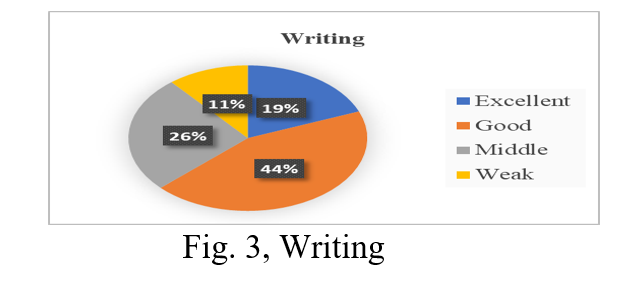
The above-mentioned pie charts display the proportion of the writing skill. Writing is one of the most pivotal skills in English language. It reforms the human thoughts and ideas to visual form. According to this pie chart, 44% of majority students are good in their writing skill. In addition, the next majority of 26% of students are middle position in their writing skill of English language. Moreover, 19% of less minority students are in the excellent position of their writing skill. Eventually, the minority 11% of students are in the weak position. Therefore, writing skill should be developed among this student severely.

Reading skill is one of the receptive skills of English language. It is used to acquire the information by reading something. In that respect, the given pie chart illustrates the capacity of the reading level of the selected students of FIA. In this pie chart, higher number of students are good position in their reading. Their percentage is 42%. As well, the second highest students are in the middle position of their reading skill. In addition, 16% of students are found excellent in their reading skill. Rest of the minority 7% of students are in the weak position of their reading level. Consequently, the lack of capacity students should be guided with the proper reading strategies by their lecturers or their guiders.
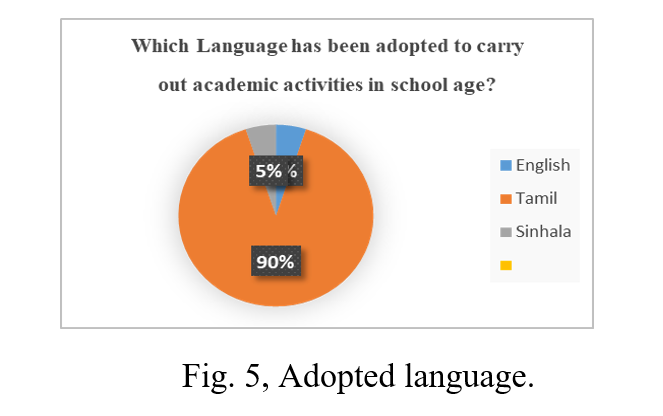
The stated pie chart shows the adopted language which was mostly carried out in their academic activities during their schooling period. According to this pie chart, it can be seen the major influence of Tamil language in their schooling period with the percentage of 90%. In which, Tamil language has been utilized by most of the students. Eventually, the rest of the language English and Sinhala have been utilized most probably in the equal level with the percentage of 5%. As a result of it, most of the undergraduates are get influenced by their L1.
Furthermore, family background is an integral part of a child's language development. That is to say, from the moment a child is born, the child becomes proficient in the language that is most spoken in the family. It was found that in the interview conducted some were born in the families with no government jobs or education was recognizable. In addition some said, “I was the first child in my family to go to university. In such a situation, even if we learn English to some extent in school, there were no one in our family who could give us the opportunity to speak English in the family or provide training to develop teaching skills.” They also said.
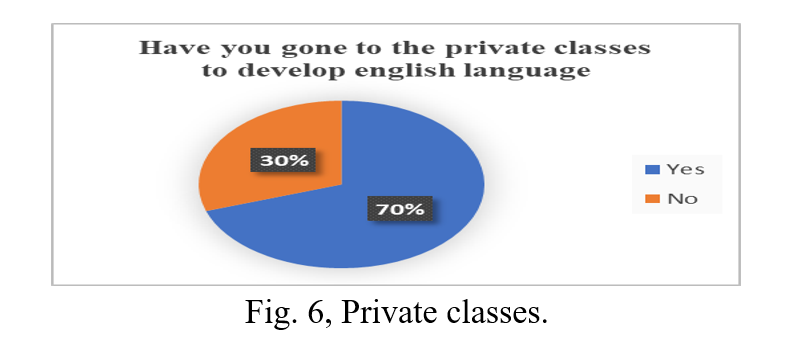
The pie chart shows the proportion of the percentage of attending private classes of the respondents. According to this chart, the majority of the students have gone to private classes to improve their English language with the percentage of 70%. As well, the minority of 30% of students have not gone to any English language private classes.
Moreover, the same fact was detected through the interview conducted with the selected students that due to the economical vulnerability, the students were unable to follow private classes to enhance their English language skills. In the interview conducted a student reported that “his father was selling vegetables and his family depended on him for his livelihood”. There are more than 05 English language classes in his hometown. “However, I did not go to such classes because of the minimum monthly fee is 800 rupees”. She said. It was an evident from the discussion among the students that such economic weakness is an essential factor for the undergraduate students behind the lack development of English language proficiency.
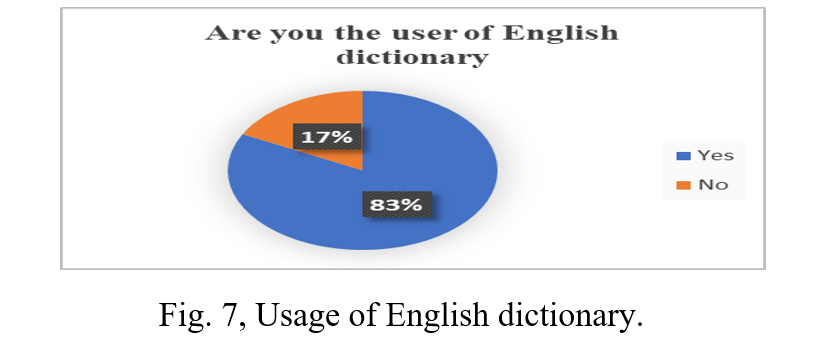
According to the utilization of English dictionary, the majority of the people are utilizing dictionaries to enhance their vocabulary power in English. Their percentage is 83%.On the other hand, rest of the 17% of students are not interested to refer any English dictionaries. It is apparently shown through this pie chart.
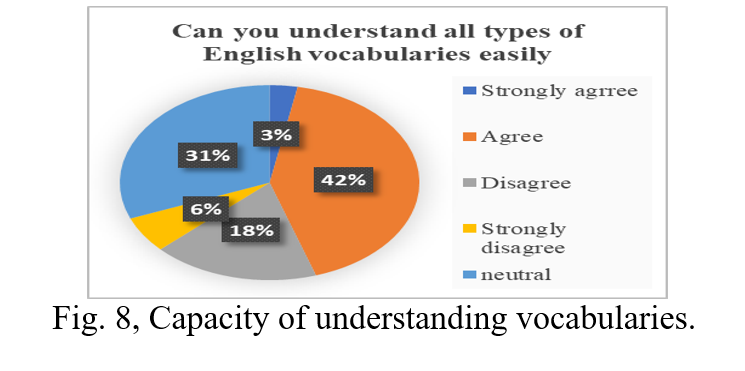
The given pie chart elaborates the capacity of the students understanding the vocabularies in English. Through this pie chart, it is clear that, the majority 42% of students agreed to understand the vocabularies, used in English language. As well, the less majority 31% of students strongly agreed that they are able to understand the vocabularies, used in English language. Moreover, 18% of students have clicked the option "disagree" that they are unable to understand the English vocabularies. And then, 6% of students strongly disagreed that they are not intelligible about the English vocabularies. Eventually, only 3% of students able to understand the vocabularies which are used in English language.
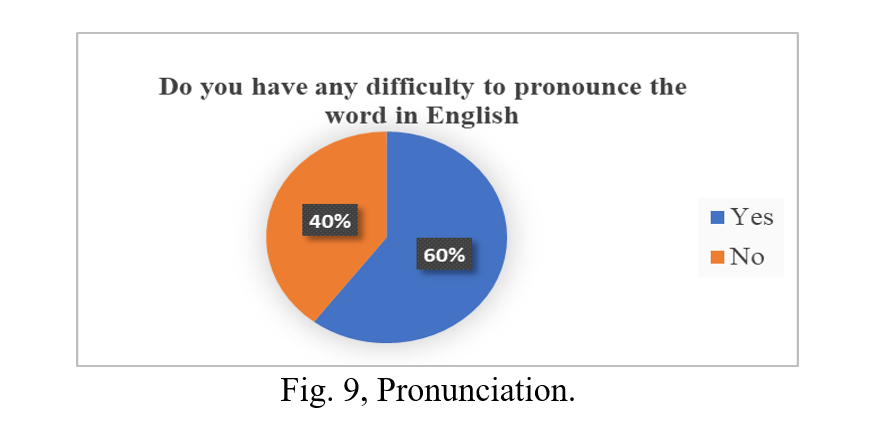
In this pie chart, it clearly depicts the proportion of the pronunciation level of the selected respondents. In that respect, 60% of the students are facing more difficulties in case of pronunciation during speaking or reading in English. While rest of the 40% of students are able to pronounce English vocabularies well.
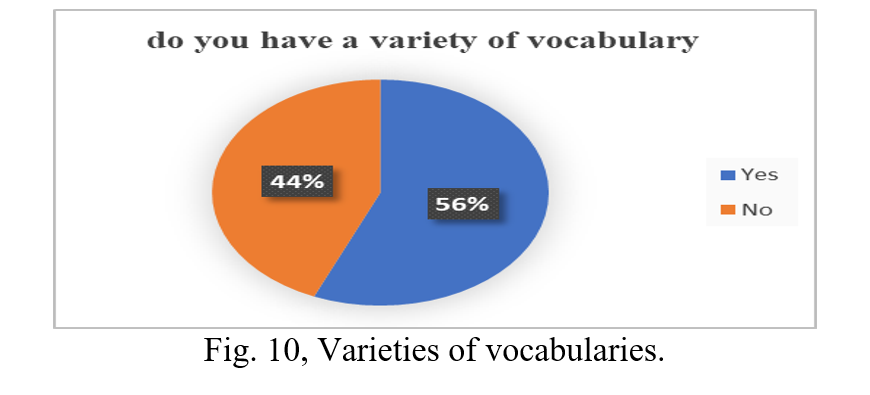
According to this pie chart, it vividly illustrates that 56% of students are vigilant of the varieties of vocabularies. As well, 44% of students are unaware of the plenty of English vocabularies.

In this pie chart, majority of the respondents are able to understand the English slang promptly with the percentage of 60%. As well, rest of the minority people are not able to understand the English slang so easily with the percentage of 40%.

According to the awareness of English grammar, the majority 58% of students are in the middle position in case of their English grammar knowledge. As well, less minority 21% of the students are good in their English grammar knowledge. In addition, 19% of students are in the weak position. Eventually, rest of the 2% of minority people are in the excellent position in case of their English grammar knowledge. Hence, the grammar knowledge among the 2nd year undergraduates of Faculty of Islamic Studies and Arabic Language must be enhanced.
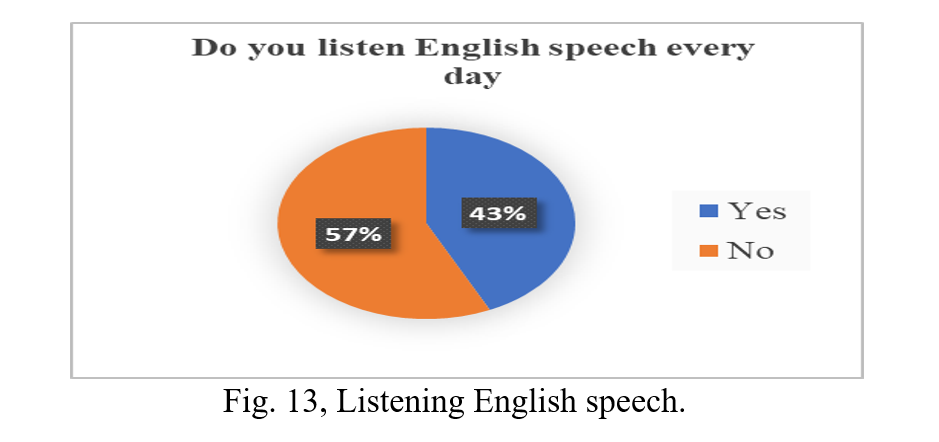
The given pie chart talks about the very specific question asked to examine whether the selected students listen to English speeches. According to the questionnaire survey 43% of the respondents had replied in the affirmative that they are listening to the English speech by usually. Nevertheless, 57% of respondents had replied in the negative that they don't listen to English speech regularly.
Moreover, it was identified through the interview that due to the dominance of their mother tongue Tamil language they were not influenced or guided to focus on listening to English speech on their daily basis.
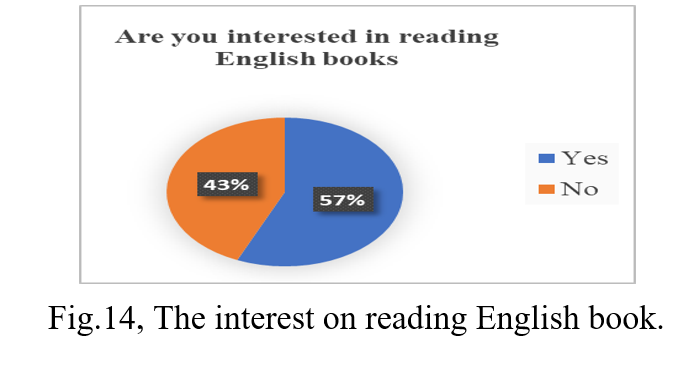
In this pie chart, approximately 57% of the students are very much interested on reading English books. Nevertheless, rest of the 43% of the students are not interested in reading English books. Therefore, it contains both the affirmative and negative responses from the respondents.
According to the questionnaire survey results, various students are encountering different challenges in case of English language skills. Based on this survey, the following findings were detected.
It was identified by the researchers that there are some students who are encountering several issues on the skills Speaking and Listening when the research was undertaken. It was caused due to the dominance of their mother tongue Tamil language. Though, they had shown severe interest on English language and done many conversations on English language, they were unable to obtain the effective outcome in case of English language. Moreover, it is known that approximately 90% of the selected students had their schooling education in the medium of Tamil language. It clearly illustrates the influence of their mother tongue. At the same time there were no remarkable issues identified by the researchers in their English language writing skill and reading skill. Because, the selected students for the purpose of improving their English language, they use to provide importance to their target language, following private classes for enhancing the capacity of their English language, giving more importance to the grammatical part of English language, reading English books and writing articles in the medium of English. Therefore, issues were not detected in regards of these both Writing skill and Reading skill among the selected students.
Language is the medium through which human beings express their idea or thoughts. Therefore, learning a second language is an essential thing for every person as well student. Since English is an international language, it is to be must learned by everyone. However, there were several problems recognized in improving English language skills among the 2nd year general following degree students of Faculty of Islamic Studies and Arabic Language. According to the findings, listening skill and speaking skills were the most problematic task among the selected students. Hence, they will be able to improve both skills Listening and Speaking by watching English speech on particular you tube channels, watching English news reading, telecasted on TV channels and having conversations in the medium of English language with their peers. Further, plenty of ways are available to enhance their Reading and Writing skills too. Such as reading English magazines, newspapers, books, articles and creating their own piece of writing etc.
Aydogan, H. (2014). The Four Basic Language skills, Whole Language & integrated skills Approach in Mainstream university classroom in Turkey.
Daghri, I. N. M. (2018). Investigating the challenges of Learning Speaking Skills in EFL classes: Perspective from preparatory Year Female Students. {Master’s thesis}. Al- Imam Mohammed Ibn Saudi Islamic University.
Gan, Z. 2012. Understanding L2 Speaking Problems: Implications for ESL Curriculum Development in Teacher Training Institution in Hong Kong. Australian Journal of Teacher Education. 37(1): 43-59
Klappenbach, A. (2022). The 12 most spoken languages in the world. https://blog.busuu.com/most-spoken-languages-in-the-world/
Masduqi, H. (2016). Integrating receptive skills and productive skills into a reading lesson. Proceeding the 2nd International Conference on Teacher Training and Education, 2(1), 507- 511
Misbah, N. H., Mohamad, M., Yunus, M., & Ya’acob, A. (2017). Identifying the Factors Contributing to Students’ Difficulties in the English Language Learning. Creative Education, 8, 1999-2008.
Mohammed, Q., & Ab Rashid, R. (2019). The sources of reading comprehension difficulties among Saudi ELF learners. Trends in Social Sciences, 1(1), 7-16. Nag, S., & Narayanan,
Wahyuningsih, S. (2018). Challenges and Opportunities of Teaching Academic writing Skills: A Case Study of Students At Iain Kudus. Jurnal Edulingua. Vol 5.
Nadesan, N. K., & Shah, P. Md. (2020). Non-Linguistic Challenges Faced by Malaysian Students in Enhancing Speaking Skills. Accessed on: 06.01.2021. Retrieved from: https://www.researchgate.net/publication/346323959